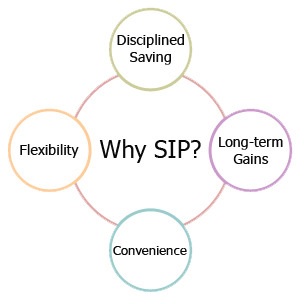What is SIP? How does it work and Benefits of SIP


What is a Systematic Investment Plan?
A Systematic Investment Plan or SIP is a smart and hassle free mode for investing money in mutual funds. SIP allows you to invest a certain pre-determined amount at a regular interval (weekly, monthly, quarterly, etc.). A SIP is a planned approach towards investments and helps you inculcate the habit of saving and building wealth for the future.
How does it work?
A SIP is a flexible and easy investment plan. Your money is auto-debited from your bank account and invested into a specific mutual fund scheme. You are allocated certain number of units based on the ongoing market rate (called NAV or net asset value) for the day.
Every time you invest money, additional units of the scheme are purchased at the market rate and added to your account. Hence, units are bought at different rates and investors benefit from Rupee-Cost Averaging and the Power of Compounding.
Rupee-Cost Averaging
With volatile markets, most investors remain sceptical about the best time to invest and try to ‘time’ their entry into the market. Rupee-cost averaging allows you to opt out of the guessing game. Since you are a regular investor, your money fetches more units when the price is low and lesser when the price is high. During volatile period, it may allow you to achieve a lower average cost per unit.
Power of Compounding
Albert Einstein once said, “Compound interest is the eighth wonder of the world. He who understands it, earns it… he who doesn’t… pays it.” The rule for compounding is simple – the sooner you start investing, the more time your money has to grow.
Example
If you started investing Rs. 10000 a month on your 40th birthday, in 20 years’ time you would have put aside Rs. 24 lakhs. If that investment grew by an average of 7% a year, it would be worth Rs. 52.4 lakhs when you reach 60.
However, if you started investing 10 years earlier, your Rs. 10000 each month would add up to Rs. 36 lakh over 30 years. Assuming the same average annual growth of 7%, you would have Rs. 1.22 Cr on your 60th birthday – more than double the amount you would have received if you had started ten years later!
Other Benefits of Systematic Investment Plans
· Disciplined Saving – Discipline is the key to successful investments. When you invest through SIP, you commit yourself to save regularly. Every investment is a step towards attaining your financial objectives.
· Flexibility – While it is advisable to continue SIP investments with a long-term perspective, there is no compulsion. Investors can discontinue the plan at any time. One can also increase/ decrease the amount being invested.
· Long-Term Gains – Due to rupee-cost averaging and the power of compounding SIPs have the potential to deliver attractive returns over a long investment horizon.
· Convenience – SIP is a hassle-free mode of investment. You can issue a standing instruction to your bank to facilitate auto-debits from your bank account
[box type=”bio”] The article is written by: Venkatesh Bijili ICICI Bank Ltd., Hyderabad[/box]
Recent Posts
Vacancies for CGM, GM, DGM and AGM increased in all Public sector banks.
Finance minister has approved revision in CGM level post in public sector banks. Earlier, the…
What is working Capital?
Working Capital is a financial indicator of operational liquidity of a business organization. Working Capital…
What is Pari Passu Charge | Simple Explanation
Meaning of pari passu charge - Pari-passu is a Latin phrase, which means "equal footing". …
Simplified Turnover Method for working capital assessment: FAQs
The Simplified Turnover Method is normally used by banks in order to assess the working…
Difference between LC and SBLC – Simplified
Letter of Credit (LC) and the ‘Standby Letter of Credit' (SBLC) are used by Importers…
Punjab National Bank Doubles Diwali Gift for Employees
Punjab National Bank (PNB) has announced a Diwali surprise event for its employees. To express…